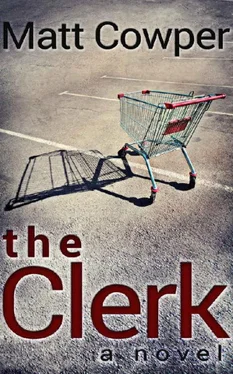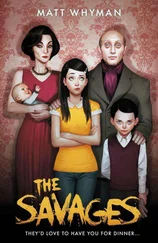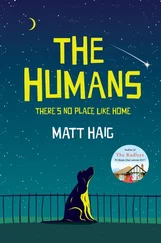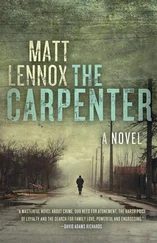“You tell us that every time you get one,” Vernon replied, “but I’ll tell her again. It’ll make her day.”
“Alright, boss,” Thomas said. “Guess it’s time to get to work.”
“Alright, buddyrow. Guess I need to get going too. There are invoices to curse and vendors to yell at — and about three more cups of coffee to drink.”
As expected, the dairy section looked shoddy. Gallons and quarts of milk sat back in their holes, as if they were hiding. Thomas shook his head; if Noah didn’t want to restock, he could’ve at least fronted what remained on the shelves. He took out a small pad and a pen, and jotted down what was needed. He really didn’t need to do this — his memory was fine — but he liked the exactness of a written list.
Once he’d made his list, he returned to the back room, grabbed a hand-truck, and entered the cold roar of the walk-in cooler. He rummaged around, stacked a few milk-filled plastic crates onto the hand-truck, and rolled the load out. When he arrived back at the dairy section, Eldridge, the head of the meat department (and, really, the only person who worked in the meat department, except when Vernon filled in sometimes), was nearby inspecting the meat packages sitting on the cool shelves.
“Morning, Eldridge,” Thomas said.
Eldridge looked up, and, as usual, Thomas was struck by how ugly the man was. His face was jowly and pale, and his lifeless yellow-white hair stuck to his head like a form-fitting helmet. A jiggling belly protruded over his belt, and his chubby hands were bloodless. He smoked a large number of cigarettes, and was thus possessed with a raspy, sometimes inscrutable smoker’s voice. But he was a damn good meat man. He kept the meat section well-stocked and spotless, and was deft with knife or band saw.
“Morning, Thomas,” he said gruffly. He’d said it the same way for the past decade. Other people, having listened to this greeting every morning for years, would have eventually taken offense, and demanded to know why Eldridge didn’t greet them with proper sunniness. Thomas, however, wasn’t bothered; Eldridge wasn’t a sunny person. He was one of those old-timers who drank and smoked, grumbled incessantly at the world’s idiocy, and ignored or belittled those he disliked — but who still took pride in his work, and could be counted on when the chips were down.
But sometimes pride in one’s work isn’t enough. Eldridge had worked in the meat department at Harris Teeter until the long-time store manager retired and a new one had come along, fresh from a term as assistant manager at another branch and ready to turn his new kingdom into “the best grocery store on the Crystal Coast.” This new manager, a clean-cut man is his mid-40s who drank protein shakes and biked in spandex, didn’t like Eldridge’s gruff demeanor or how he mocked company policies such as “The Five Keys to Freshness.” But mainly, he didn’t like how Eldridge said good morning to him. And so he’d fired him, saying he “wasn’t a team player” and that “his poor attitude drove customers away.” (This was true, in part: he drove the idiots and the arrogant away if they asked him stupid questions or tried to act superior.) Vernon heard about all of this through the grapevine, and hired Eldridge immediately. Vernon’s long-time meat man, an equally-gruff man named Braxton, had been grumbling for years that he wanted to retire, if only Vernon would find a decent replacement so the meat department wouldn’t go to hell when he left. And so Eldridge came on board, and the two gruff men talked gruffly to each other for a few months in what the Harris Teeter manager would’ve called a “transition period,” and then Braxton retired and Eldridge took over.
His morning greeting over, Eldridge returned to work. Stubby fingers played across plastic-sealed meat packages (Eldridge’s packages were the tightest and neatest Thomas had ever seen), checking dates and freshness. Thomas watched for a few seconds, then returned to his own task. In a few moments, he’d placed all the new stock on the shelves. He stacked the now basically weightless crates back onto the hand truck and rolled to the back. He went back into the cooler to look for some Nestle Cinnamon Hazelnut Coffee Creamer, even though he was almost certain they didn’t have any more in stock. Still, better to be sure.
After taking a piss break, he moved on to produce. The packaged mushrooms were low, and the tomatoes looked like they needed to be picked through. He loaded up the tank-like four-wheeled cart (nicknamed “Tank”) and went to work.
At noon, Thomas sat down with a ham and turkey sandwich from the deli cooler and a Kiwi Kornucopia smoothie. There was no true break room at Oxendine’s Grocery; instead, Thomas sat in the all-purpose “sink room,” at a metal table covered with old, now-obsolete scales, half-eaten bags of potato chips, sticker dispensers (“SALE,” “BUY ONE GET ONE,” “FRESH”), and out-of-date canned goods. Behind him were the three industrial sinks, the sink on the far right constantly dripping its one-drop-every-three-seconds drip. (The timing hadn’t changed in at least fourteen years.) Thomas sat on a tall wooden stool that had been carved with dozens of employee initials and hip in-jokes over the years, munching contentedly.
Across the way, Vernon was in his office, the door shut. He was likely napping; rare was the day when Vernon Oxendine made it to one o’clock without dozing off in his squeaking office chair. The rest did him good; he would emerge after thirty or forty-five minutes “bright-eyed and bushy-tailed,” as he would say. When Thomas first starting working at Oxendine’s, Vernon never napped, but then they were both much younger back then.
Cynthia, the deli worker today, bustled into the room with a cutting board and knife, which she dumped into one of the sinks. Thomas glanced at her as he sipped his smoothie: she was an earnest, wholesome girl of twenty-five with wide hips, thick arms, and a nice bust. She walked the fine line between “thick” and “fat,” and in the five years she’d worked here, Thomas had seen her veer from one category to the other several times.
When she’d first started, Thomas had appraised her surreptitiously, much like he was appraising her now. Even though he was much older, Thomas knew he was still a reasonably attractive man. It wasn’t bragging; it was objective fact. He was thin, with a few muscles in the right places, and his face was unwrinkled save for a few crow’s feet around his eyes. No gray had entered his thick brown hair. Someone once told him he had a face like a young Paul Newman — but another person had said he looked like Leonardo DiCaprio. Thomas couldn’t reconcile the differences. He thought his face looked like any somewhat handsome face: it was angular, with full lips, thick brown eyebrows, and deep brown eyes.
He’d dated and had sex with younger women before — but, he’d had to admit, not with a girl fifteen years younger than him. Nonetheless, he’d felt confident — mostly.
But after a few conversational sallies towards Cynthia, Thomas had abandoned any thought of courtship. Cynthia was too wholesome; it was like talking to a choir girl. He’d shivered when he imagined how their sex would be. He would be too afraid to be rough, lest she gasp in horror and start crying. Even their fights would be wholesome: he could imagine Cynthia sitting him down and producing a typed report and/or list, and then calmly reading him said report/list, and then asking in a calm, mediating voice, “I hope you understand how I feel now. What are we going to do to fix this situation? Let’s come up with rational solutions. Or, if you dispute my report/list, please tell me how I erred. OK, dear?”
Her laugh was also distressing. It was like something out of a Disney movie. Fairies or helpful spirits giggled like that, not human beings.
Читать дальше












